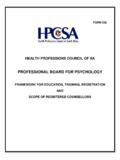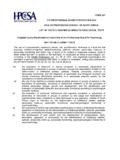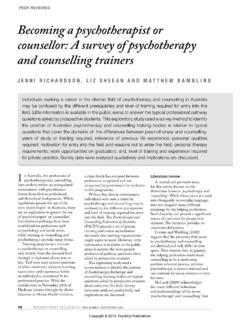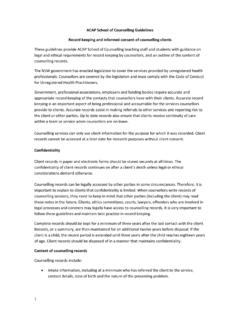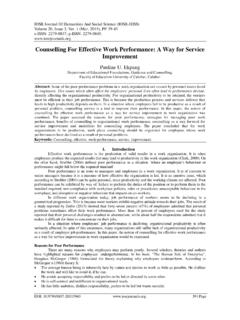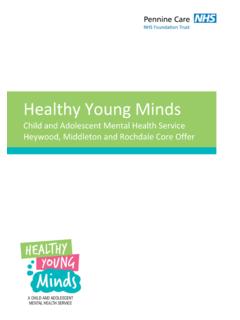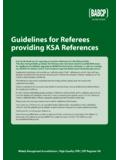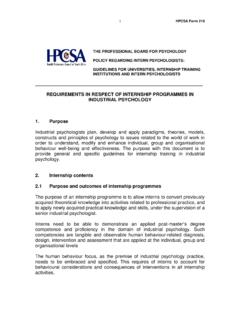Transcription of Scope of Practice Guidelines for Educational …
1 Professional Board for Psychology Scope of Practice Guidelines for Educational psychologists . January 2017 Practice Guidelines for Educational Psychology 2 Table of Contents Status and purpose of the Document .. 3 SECTION A .. 3 Guiding Principles .. 3 Principle 1: The name of the category .. 4 Principle 2: The context and population served .. 4 Principle 3: The Theoretical Framework .. 6 Principle 4: Education and Training .. 6 Principle 5: The Board Specified Internship .. 7 Principle 6: The referral .. 7 SECTION B .. 8 INTERPRETATION/ AMPLIFICATION OF THE Scope OF Practice OF Educational psychologists .. 8 ANNEXURE A .. 11 Acknowledgements .. 23 Practice Guidelines for Educational Psychology 3 Status and Purpose of the Document This document has been prepared by the Professional Board to provide guidance on the Scope of Practice for Educational psychologists as contained in the Regulations Defining the Scope of the Profession of Psychology published as Government Notice No.
2 R. 704 of 11 September 2011, Defining the Scope of the Profession of Psychology (Annexure A)1. Its purpose is to provide clarity for practitioners in response to possible vagueness of the regulations and to guide members of the profession to Practice professionally and ethically within their Scope . These Guidelines do not replace or supersede the regulations but must be read in conjunction. Within the South African context, the legislation permits psychologists to only practise in specific professional categories. The categories are aligned with international Practice categories. While there are commonalities across professional categories, each professional category is substantially distinct to ensure that a variety of psychological services are provided to meet the specific needs, challenges and mental health care of all people in our country. In this regard the Practice of each category must play a significant and specific role to ensure that all sectors of our population have access to psychological services.
3 All categories should not compete but collaborate, work and complement one another in the provision of psychological services. Working collaboratively will help reduce the burden of psychological disorders and enhance the mental health and wellness of the population. Further, in providing psychological services, it is important that the public and all health professionals have a clear understanding of each category and the inherent roles and responsibilities of practitioners in each category so that there is no misrepresentation or confusion. SECTION A Guiding Principles As with all professional categories the following principles guide the process for understanding the regulation on Scope of Practice published as Government Notice No. R. 704 of 11 September 2011: 1 Note: the 2011 Amendment Regulations were declared invalid by the Western Cape Division of the High Court, Cape Town, November 2016.
4 However, the court suspended that declaration of invalidity for a period of 24 months to enable the Minister to lawfully promulgate new regulations. Practice Guidelines for Educational Psychology 4 Figure 1: Guiding Principles Principle 1: The name of the category The name of the category provides a description, explanation and the domain of Educational psychologist. In South Africa, Educational psychology and Educational psychologist are the common titles used as opposed to school psychology or school psychologist that are used elsewhere in the world. The term Educational psychologist is favoured since these psychological practitioners do not work exclusively in schools but in broader contexts to address the Educational psychological and related needs of people in our country. Educational psychology is a category within professional psychology that focuses on alleviating: emotional, learning, academic, intellectual, behavioural, social and developmental difficulties in children and young people within the systems in which they function including families, schools, peer groups etc.
5 , thereby providing extensive support and psychological services to any role-player which may support clients optimal functioning. This may include family-based intervention, teacher support and learning support. In addition, Educational psychologists enhance the vocational development of children and adults. With regards to individual adults, the Educational psychologist can provide expert knowledge and skills with regards to learning and developmental difficulties across the lifespan. Furthermore, there is an emphasis to promote the well-being of families, groups, organisations and communities. Principle 2: The context2 and population served The context and range of work also provides a practical guide for Scope . Educational psychologists work in learning and Educational contexts or other contexts which could impact on learning and/or development. Educational psychologists work in any context 2 Working in Educational and learning context, such as, Early Childhood Development (ECD), schools, colleges, and universities Principle 1: NamePrinciple 2 Theoretical FrameworkPrinciple 3: ContextPrinciple 4: Education & TrainingPrinciple 5: InternshipPrinciple 6: Referral Practice Guidelines for Educational Psychology 5 supporting learners3 across the developmental lifespan who experience learning and/or developmental challenges within the context they function in.
6 Educational psychologists work in a broad array of contexts recognising that education is crucial for development. They apply principles of learning to the development of competence both within and outside the Educational milieu by working with learners of all ages and their families, consulting teachers and other professionals regarding cognitive, affective, social and behavioural performance, assess developmental needs and develop Educational environments to prevent and meet those diverse needs. In addition, Educational psychologists work towards the promotion of resilience and healthy functioning in learners. Consistent with an emphasis on the development of competence, Educational psychologists provide services to learners of all ages as well as the systems and agencies that serve them and their families. These include populations with: i.
7 Learning problems from birth to adulthood. ii. Specific disabilities that affect learning, behaviour, emotional, social and family functioning and school-to-work transitions iii. Mild to moderate mental disorders4 in childhood affecting learning, development and mental health. iv. Emotional disorders that influence mental health within the context of learning and development. v. Career guidance and counselling. vi. Learning disabilities, learning difficulties, multiple disabilities, intellectual disabilities, gifted and talented learners, and developing individual Educational plans for rehabilitation. In addition, Educational psychologists serve the following populations: i. Families who request diagnostic evaluations of learning disabilities and assistance with academic, socio-emotional and behavioural problems at home and at school or in the community.
8 Ii. Teachers, parents, caregivers, siblings, peers and others to specifically enhance healthy relationships and environments that promote learning and development iii. Organisations and agencies to promote contexts that are conducive to learning and development iv. Communities to design, execute and evaluate preventative psycho- Educational programmes in diverse contexts. Educational psychologists are involved in the provision of teacher in-servicing on a variety of issues such as career counselling, behaviour management and parenting skills. Especially important is their involvement in a variety of psychosocial intervention and preventative programmes that affect our schools and education institutions, such as, school violence, bullying, abuse, youth pregnancies, underachievement, etc. 3 Individual or groups gaining formal knowledge or skill in something by studying.
9 4 As defined in the current Diagnostic and Statistical Manual of Mental Disorder (DSM) and International Classification of Disease (ICD) Practice Guidelines for Educational Psychology 6 Further, Educational psychologists research innovative ways of supporting vulnerable people and are often involved in the training and support of teachers, teacher assistants and others working with people experiencing psychoeducational difficulties. Principle 3: The Theoretical Framework Educational psychologists approach the professional training and Practice from various theoretical frameworks or paradigms. Educational psychologists combine psychological and Educational paradigms and have core competencies in how people learn and behave and how they develop cognitively, socially, and emotionally. Their work is extensive, covering mainstream and special sectors relating to teaching and learning, behaviour, family intervention, community-based interventions, career counselling and optimal emotional and social development.
10 At the core of Educational psychology is an emphasis on learning and developmental psychology. Broadly Educational psychology is informed by a developmental-wellness model and yet it is also diagnostically focused whilst aiming to be transformative and socially relevant. The primary responsibilities of Educational psychologists include assessment, diagnosis, prevention and intervention. They work in a variety of ways including observations, interviews and assessments in order to generate a comprehensive case conceptualisation to diagnose (describe and explain) the origin of the difficulty, in order to inform appropriate intervention which might take the form of individual, family or group therapy and psycho-education, consultation, advice and support to the individual client, teachers, parents, and the wider community. They also have competencies in brief and psychoeducational counselling, psychotherapy and career counselling.


